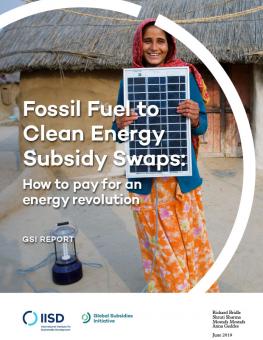
Fossil Fuel to Clean Energy Subsidy Swaps: How to pay for an energy revolution
A “subsidy swap”—reallocating some of the savings from fossil fuel subsidy reform to fund the clean energy transition—can bring in economic, social and environmental benefits.
Reallocating some of the savings from fossil fuel subsidy reform to fund the clean energy transition can bring in economic, social and environmental benefits.
Key Messages
This report presents the case for a "subsidy swap"—reallocating some of the savings from fossil fuel subsidy reform to fund the clean energy transition.
Fossil fuel to clean energy subsidy swaps are already taking place. Globally, fossil fuel subsidies have fallen and global investments in renewable energy have exceeded investments in fossil fuels since 2008. Renewable global installed capacity additions have exceeded fossil fuel generation since 2014.
The report shares examples of four countries—India, Indonesia, Zambia and Morocco—that have already been taking concrete action and leading the way by implementing fossil fuel to clean energy swaps. Sharing these experiences is a key tool to show how swaps can be a feasible option for other countries.
When governments reform fossil fuel subsidies, there are many competing demands for how to reallocate resources, including spending on public health, education and social protection. This report makes the case for placing the promotion of clean energy alongside these other priorities and describes the economic, social and environmental benefits that such a move would bring, through a “subsidy swap.” The report sets out the international context of subsidy swaps; summarizes notable country experiences with swaps in India, Indonesia, Zambia and Morocco; and calls for policy-makers to include swaps as part of their fossil fuel subsidy reform implementation strategies.
Participating experts
You might also be interested in
At long last, Canada restricts oil and gas subsidies (except for all the loopholes)
Environment and Climate Minister Steven Guilbeault has unveiled detailed plans to phase out "inefficient" oil and gas subsidies, based on guidelines released yesterday morning that take effect immediately and are meant to fulfill a 14-year-old pledge by G20 countries.
Heatwaves to hit China once every 5 years as global extreme weather events multiply, study finds
Record-breaking heatwaves that have scorched North America, Europe and China are set to worsen in future unless the world stops burning fossil fuels, according to a study by the World Weather Attribution (WWA) academic initiative.
Canada to Cut Oil & Gas Subsidies
The Canadian federal government has implemented a framework to revoke subsidies for fossil fuels that are deemed inefficient. However, the framework lacks details on the specific subsidies to be eliminated and does not provide a dollar amount for the cuts. Canada, as the fourth-largest oil producer in the world, is the first country to comply with a 2009 pledge made by the Group of Twenty (G20) nations. The government plans to exempt oil and gas projects that have plans to reduce emissions and utilize carbon capture and storage (CCS) technology. Federal Environment Minister Steven Guilbeault stated that the objective is for federal support to be directed only towards projects that decarbonize the sector and result in significant greenhouse gas emissions reductions.
Canada Bans Some Fossil Fuel Subsidies, Meeting Decade-Old G-20 Pledge
Canada revealed new rules to ban some fossil fuel subsidies, targeting those that unfairly advantage oil and gas, solely support sector activities or endorse consumption of fuels that worsen climate change.